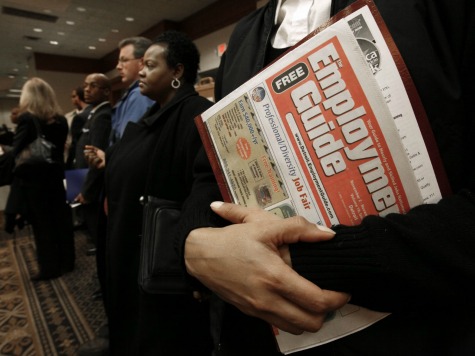GDP growth was revised up for the second quarter to 2.5 from 1.7 percent, because the trade deficit was much smaller than originally estimated and investments in inventory were revised upward.
The trade gap remains a substantial drag on economy and continued improvements will be needed to main stronger growth. Continued slow growth in consumer spending indicates household balance sheets have not strengthened enough to instigate more robust growth in the second half.
Small businesses are expressing more optimism through sentiment surveys; however, they are not spending enough on new structures and capital goods to ignite stronger growth.
Businesses of all sizes remain wary about ObamaCare mandates, more cumbersome and costly business regulations, and global economic and political conditions. Managers are inclined to squeeze more production out of existing facilities to meet moderately growing demand and remain cautious about adding full time workers.
Since January, 936,000 more Americans report working part time, while only 27,000 more say they have obtained full-time employment. This shift places downward pressure on wages, which have increased less than one percent over the last six months.
Rising mortgage rates in anticipation that the Federal Reserve will scale purchases of mortgage back securities and longer-term Treasury debt (QE3) are slowing new home sales.
Overall, economists expect growth to continue at a somewhat stronger pace in the second half, but that will require continued improvements in the trade deficit, stable oil prices, and for Congress and the President to reach an agreement to raise the debt ceiling in October without too much drama.
The failure of House Republicans, Senate Democrats, and President Obama to reach a compromise on a fiscal year 2014 budget is less menacing. A continuing resolution to maintain current outlays, subject to further spending cuts through sequestration, would slow the economy much less than a compromise budget. The latter would almost certainly entail higher taxes to appease the president, and the tax increases he obtained in January are already slowing growth and job creation.
Since mid 2009, growth has averaged a paltry 2.2 percent, whereas following a deeper recession the Reagan recovery produced 5 percent growth over a comparable time span.
Expectations of permanently slower growth are hardening disturbing changes in the structure of the labor market and social conditions. These days, new college graduates often work at unpaid internships while taking part-time jobs at places like Starbucks to meet minimal living expenses.
Many young people have no prospects for meaningful permanent employment, and, saddled with burdensome education loans, continue to live with parents and postpone marriage into their late 20s and 30s. All this slows new home construction, purchases of appliances, and suppresses the birth rate–nothing drives consumer spending like babies, and we are simply not getting enough middle class births.
By scaling back QE3 this fall, the Federal Reserve would exacerbate these conditions, but it may have little choice. Historically low interests rates have inspired Wall Street speculators to rush to purchase homes and created distortions in other asset markets, such as for agricultural land and stocks and bonds. Destructive bubbles could cause another deep recession.
The Fed is between a rock and hard place. Obama Administration policies are decidedly anti growth–for example, the failure to confront China on the undervalued yuan; failure to approve more offshore drilling; failure to properly regulate banks, causing both loan shortages for good businesses and too many bad loans for questionable enterprises; health care policies that raise the cost of benefits and slow hiring; and regulatory overreach elsewhere that stifles manufacturing investment.
If the Fed slows bond purchases, it risks torpedoing a fragile recovery. If it continues easy money policies, distortions in asset markets continue to grow, and new bubbles will threaten another financial crisis.
Peter Morici is an economist and professor at the Smith School of Business, University of Maryland, and a widely published columnist. Follow him on Twitter.

COMMENTS
Please let us know if you're having issues with commenting.